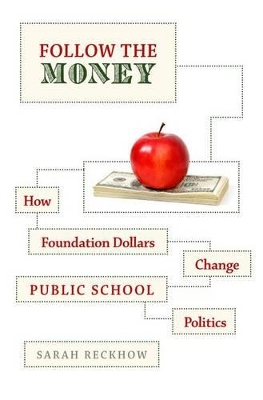Studies in Postwar American Political Development
1 total work
Some of the nation's wealthiest philanthropies, including the Bill and Melinda Gates Foundation, the Walton Family Foundation, and the Broad Foundation have invested hundreds of millions of dollars in education reform. With vast wealth and a political agenda, these foundations have helped to reshape the reform landscape in urban education. In Follow the Money, Sarah Reckhow shows where and how foundation investment in education is occurring and presents
in-depth analysis of the effects of these investments within the two largest urban districts in the United States: New York City and Los Angeles.
In New York City, centralized political control and the use of private resources have enabled rapid implementation of reform proposals. Yet this potent combination of top-down authority and outside funding also poses serious questions about transparency, responsiveness, and democratic accountability in New York. Furthermore, the sustainability of reform policies is closely linked to the political fortunes of the current mayor and his chosen school leader. While the media has highlighted the
efforts of drastic reformers and dominating leaders such as Joel Klein in New York City and Michelle Rhee in Washington, D.C., a slower, but possibly more transformative, set of reforms have been taking place in Los Angeles. These reforms were also funded and shaped by major foundations, but they work
from the bottom up, through charter school operators managing networks of schools. This strategy has built grassroots political momentum and demand for reform in Los Angeles that is unmatched in New York City and other districts with mayoral control. Reckhow's study of Los Angeles's education system shows how democratically responsive urban school reform could occur-pairing foundation investment with broad grassroots involvement.
Bringing a sharp analytical eye and a wealth of evidence to one of the most politicized issues of our day, Follow the Money will reshape our thinking about educational reform in America.
in-depth analysis of the effects of these investments within the two largest urban districts in the United States: New York City and Los Angeles.
In New York City, centralized political control and the use of private resources have enabled rapid implementation of reform proposals. Yet this potent combination of top-down authority and outside funding also poses serious questions about transparency, responsiveness, and democratic accountability in New York. Furthermore, the sustainability of reform policies is closely linked to the political fortunes of the current mayor and his chosen school leader. While the media has highlighted the
efforts of drastic reformers and dominating leaders such as Joel Klein in New York City and Michelle Rhee in Washington, D.C., a slower, but possibly more transformative, set of reforms have been taking place in Los Angeles. These reforms were also funded and shaped by major foundations, but they work
from the bottom up, through charter school operators managing networks of schools. This strategy has built grassroots political momentum and demand for reform in Los Angeles that is unmatched in New York City and other districts with mayoral control. Reckhow's study of Los Angeles's education system shows how democratically responsive urban school reform could occur-pairing foundation investment with broad grassroots involvement.
Bringing a sharp analytical eye and a wealth of evidence to one of the most politicized issues of our day, Follow the Money will reshape our thinking about educational reform in America.
